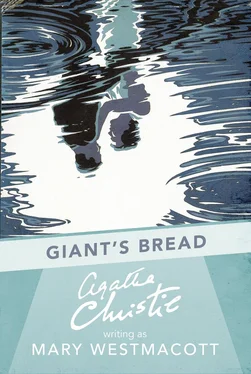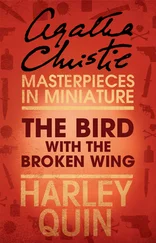1 ...6 7 8 10 11 12 ...18 And then something happened which surprised him very much. Nurse Frances got up from her chair.
‘I’m afraid we must turn you out for this evening, Mr Deyre,’ she said quietly. ‘Vernon and I have things to do.’
This astonished Vernon very much, because he couldn’t think what those things were. He was still more puzzled when his father got up also and said in a low voice:
‘I beg your pardon.’
Nurse Frances bent her head a little, but remained standing. Her eyes met Walter Deyre’s steadily. He said quietly:
‘Will you believe that I am really sorry, and let me come tomorrow?’
After that, in some way that Vernon could not have defined, his father’s manner was different. He no longer sat so near Nurse Frances. He talked more to Vernon and occasionally they all three played a game—usually Old Maid for which Vernon had a wild passion. They were happy evenings enjoyed by all three.
One day when Nurse Frances was out of the room, Walter Deyre said abruptly:
‘Do you like that Nurse of yours, Vernon?’
‘Nurse Frances? I like her lots. Don’t you, Father?’
‘Yes,’ said Walter Deyre, ‘I do.’
There was a sadness in his voice which Vernon felt.
‘Is anything the matter, Father?’
‘Nothing that can be put right. The horse that gets left at the post never has much chance of making good—and the fact that it’s the horse’s own fault doesn’t make matters any better. But that’s double Dutch to you, old man. Anyway, enjoy your Nurse Frances while you’ve got her. There aren’t many of her sort knocking about.’
And then Nurse Frances came back and they played Animal Grab.
But Walter Deyre’s words had set Vernon’s mind to work. He tackled Nurse Frances next morning.
‘Aren’t you going to be here always?’
‘No. Only till you get well—or nearly well.’
‘Won’t you stay always? I’d like you to.’
‘But you see, that’s not my work. My work is to look after people who are ill.’
‘Do you like doing that?’
‘Yes, very much.’
‘Why?’
‘Well, you see, everyone has some particular kind of work that they like doing and that suits them.’
‘Mummy hasn’t.’
‘Oh, yes, she has. Her work is to look after this big house and see that everything goes right, and to take care of you and your father.’
‘Father was a soldier once. He told me that if ever there was a war, he’d go and be a soldier again.’
‘Are you very fond of your father, Vernon?’
‘I love Mummy best, of course. Mummy says little boys always love their mothers best. I like being with Father, of course, but that’s different. I expect it’s because he’s a man. What shall I be when I grow up, do you think? I want to be a sailor.’
‘Perhaps you’ll write books.’
‘What about?’
Nurse Frances smiled a little.
‘Perhaps about Mr Green, and Poodle and Squirrel and Tree.’
‘But everyone would say that that was silly.’
‘Little boys wouldn’t think so. And besides, when you grow up, you will have different people in your head—like Mr Green and the children, only grown up people. And then you could write about them.’
Vernon thought for a long time, then he shook his head.
‘I think I’ll be a soldier like Father. Most of the Deyres have been soldiers, Mummy says. Of course you have to be very brave to be a soldier, but I think I would be brave enough.’
Nurse Frances was silent a moment. She was thinking of what Walter Deyre had said of his small son.
‘He’s a plucky little chap—absolutely fearless. Doesn’t know what fear is! You should see him on his pony.’
Yes, Vernon was fearless enough in one sense. He had the power of endurance, too. He had borne the pain and discomfort of his broken leg unusually well for so young a child.
But there was another kind of fear. She said slowly after a minute or two:
‘Tell me again how you fell off the wall that day.’
She knew all about The Beast, and had been careful to display no ridicule. She listened now to Vernon and as he finished she said gently:
‘But you’ve known for quite a long time, haven’t you, that it isn’t a real Beast? That it’s only a thing made of wood and wires.’
‘I do know ,’ said Vernon. ‘But I don’t dream it like that. And when I saw it in the garden coming at me—’
‘You ran away—which was rather a pity, wasn’t it? It would have been much better to have stayed and looked . Then you’d have seen the men, and would have known just what it was. It’s always a good thing to look . Then you can run away afterwards if you still want to—but you usually don’t. And Vernon, I’ll tell you something else.’
‘Yes?’
‘Things are never so frightening in front of you as they are behind you. Remember that. Anything seems frightening when it’s behind your back and you can’t see it. That’s why it’s always better to turn and face things—and then very often you find they are nothing at all.’
Vernon said thoughtfully: ‘If I’d turned round I wouldn’t have broken my leg, would I?’
‘No.’
Vernon sighed.
‘I don’t mind having broken my leg very much. It has been very nice having you to play with.’
He thought Nurse Frances murmured ‘Poor child’ under her breath, but that, of course, was absurd. She said smiling:
‘I’ve enjoyed it too. Some of my ill people don’t like to play.’
‘You really do like playing, don’t you?’ said Vernon. ‘So does Mr Green.’
He added rather stiffly, for he felt shy:
‘Please don’t go away very soon, will you?’
But as it happened, Nurse Frances went away much sooner than she might have done. It all happened very suddenly, as things in Vernon’s experience always did.
It started very simply—something that Myra offered to do for Vernon and that he said he would rather have done by Nurse Frances.
He was on crutches now for a short and painful time every day, enjoying the novelty of it very much. He soon got tired, however, and was ready to go back to bed. Today, his mother had suggested his doing so, saying she would help him. But Vernon had been helped by her before. Those big white hands of hers were strangely clumsy. They hurt where they meant to help. He shrank from her well-meant efforts. He said he would wait for Nurse Frances who never hurt.
The words came out with the tactless honesty of children, and in a minute Myra Deyre was at white heat.
Nurse Frances came in two or three minutes later to be received with a flood of reproach.
Turning the boy against his own mother—cruel—wicked—They were all alike—everyone was against her—She had nothing in the world but Vernon and now he was being turned against her too.
So it went on—a ceaseless stream. Nurse Frances bore it patiently enough without surprise or rancour. Mrs Deyre, she knew, was that kind of woman. Scenes were a relief to her. And hard words, Nurse Frances reflected with grim humour, can only harm if the utterer is dear to you. She was sorry for Myra Deyre for she realized how much real unhappiness and misery lay behind these hysterical outbursts.
It was an unfortunate moment for Walter Deyre to choose to enter the nursery. For a moment or two he stood surprised, then he flushed angrily.
‘Really, Myra, I’m ashamed of you. You don’t know what you’re saying.’
She turned on him furiously.
‘I know what I’m saying well enough. And I know what you’ve been doing. Slinking in here every day—I’ve seen you. Always making love to some woman or other. Nursemaids, hospital nurses—it’s all one to you.’
‘Myra—be quiet!’
Читать дальше












